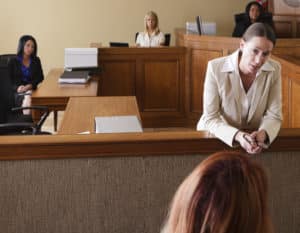What is Direct Examination?

Direct examination occurs in court or at a pretrial deposition when a lawyer questions a friendly witness under oath. The witness might be the injured victim, an expert witness (in a medical malpractice case, for example), or a third-party witness.
An effective direct examination can dramatically increase your odds of winning your personal injury claim.
Table of Contents
Contrast With Cross-Examination

In cross-examination, the lawyer confronts a hostile witness.
Your lawyer might, for example, cross-examine the at-fault driver in a car accident, looking for a way to prove the witness was at fault.
Nevertheless, sometimes even a “friendly” witness will surprise a lawyer with hostile testimony.
What Types of Questions Lawyers Can Ask Witnesses
When a lawyer conducts a direct examination of a lay witness, they can seek to elicit both direct and circumstantial evidence. “I saw Jim’s car run the red light and smash into the plaintiff’s car” would be an example of direct evidence, whereas “I saw Jim in a nightclub about an hour before his car accident, and he appeared to be intoxicated” is circumstantial.
Most of the time, a witness will testify on matters of fact or offer an opinion that an ordinary person would be qualified to provide. The lawyer might also ask them to identify documents, photos, or other items. The lawyer might ask the witness to identify their own signature on a document.
Texas prohibits lawyers from asking certain kinds of questions even on direct examination, including but not limited to:
- Leading questions. These are questions that include the desired answer, such as “Isn’t it true that….?”
- Questions that call for inadmissible hearsay answers, such as, “I read in the police report that the accident was Jim’s fault.” Typically, only the officer who wrote the report could testify about its contents.
- Questions that call for a legal conclusion: “Do you believe the defendant was negligent?”
If the lawyer asks an inappropriate question, the opposing party’s lawyer should immediately object and provide a reason for their objection. The judge will then sustain the objection or overrule it. Even if the judge overrules it, the lawyer may be able to use their objection to support an appeal.
Special Case: Expert Witnesses
Expert witnesses enjoy much greater latitude when testifying in court, but only within their field of expertise. Expert medical witnesses are routine in medical malpractice cases, for example. Many expert witnesses no longer practice in the profession of their knowledge and work full-time as “professional expert witnesses.”
A court must qualify an expert before their testimony. Although an expert witness typically holds an advanced degree such as a Ph.D., not all of them do. There are other ways that certain expert witnesses can demonstrate their expertise (publications in professional journals, for example).
An expert witness can offer their professional opinion and the basis for their opinion. Their credibility with juries tends to be high. Make sure to learn everything you can about the expert witnesses’ reasoning and conclusions before you put them on the stand.
Conducting an Effective Direct Examination
Following are some time-honored tips for conducting an effective direct examination:
- Know your case inside and out, down to the last detail. Know how each witness fits into the case.
- Juries love stories. Turn your case into a story (a true story) that will appeal to them. Ask your witnesses questions that call for facts and themes that will allow you to construct your story.
- Bring out any weaknesses in your case so you can explain them. You can be confident that the opposing lawyer will zero in on these weaknesses during their cross-examination of your witnesses.
- Never try to hide anything from the jury. It will come out sooner or later, and your attempt to hide it will magnify its significance. It will also detract from your credibility.
- Impress on your witnesses that they must tell “the truth, the whole truth, and nothing but the truth.”
- Memorize every statement your witness has ever given to anybody. You have the right to examine this evidence, and the last thing you need is a witness who contradicts themselves or changes their story.
- Get criminal histories on all your witnesses. You can be confident the opposing lawyer will do this and that they will use anything they find to discredit your witnesses.
- Interview all your witnesses face-to-face before trial. Rehearse your testimony, but don’t falsify anything. Make sure your witness knows every question you will ask in advance and knows how they will answer.
- Cross-examine your own witnesses in rehearsal to look for weaknesses in your own case that you must deal with.
- Remember that any unfavorable testimony will come out sooner or later. It’s better that the jury hear it from you than from the opposing lawyer.
Now, put together your witness’s answers to make a compelling story that you can present to the jury.
A Skilled Personal Injury Lawyer Knows How To Perform a Direct Examination
An adequate direct examination in court or at a pretrial deposition can help you tell your story and win your claim. To maximize your chances of victory, you will need a lawyer who is well-versed in the art of direct examination.
An effective direct examination during a deposition can help you avoid a trial altogether because the opposing party will prefer to settle the claim.
Contact an attorney from Attorney Brian White Personal Injury Lawyers by calling our office at (713) 500-5000. We will schedule a free consultation to discuss your case with one of our Houston personal injury attorneys.
